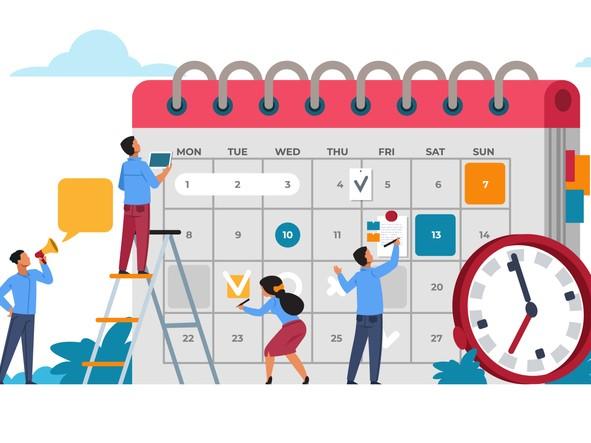
It can be different: managing time, tasks and well-being in academia

You may also like
As an early-career academic, I’ve lost count of the times I’ve been told that academia “can’t be a 40-hour-a-week career”. Mentors, senior leaders and colleagues have insisted that allowing our work to fill our evenings, weekends and holidays is “just what it takes” to be a successful academic. I respect those people’s experiences, hard work and achievement, but this isn’t what I want for myself. It also isn’t a feasible option for me – with two young children and other community commitments, it’s rare that I can find more than 40 hours a week to spend on my job even if I wanted to do so!
Fortunately, I’ve also had people both tell me and show me that it can be different. As academics, we don’t have to choose either well-being or success. Knowing that this is possible has set me on a path of experimentation, ongoing learning and using my researcher skills to grapple with the puzzle of how to live and work sustainably in academia.
- How to survive the academic treadmill
- Good daily work habits for early career researchers
- Three easy ways to stay healthy in the new year (even with a busy job)
I’m five years into this journey, and it was recently suggested to me that having been a distance doctoral candidate, a productive early-career scholar and a full-time academic mama, I must have developed “formidable” time-management skills. It doesn’t feel like that from the inside! However, below are six key things I’ve learned so far.
Understand the nature of knowledge work
The biggest “unlocker” for me was reading the early chapters of Alexander Clark and Bailey Sousa’s 2018 book, How to Be a Happy Academic. These scholars from the University of Alberta drew on the work of Peter Drucker to characterise academic work as “extreme knowledge work”, breaking down the characteristics of knowledge work and knowledge workers (in this case, academics). Clark and Sousa pointed out that the work we do has no upper thresholds and, importantly, that “time is always insufficient for knowledge workers to do all that could be done. Success involves making the right choice of what to do.”
Understanding this idea was transformative for me. I had been working on the assumption that it was possible to do all the things, and that success meant doing them all (preferably very well). But if we change the premise and accept that we can’t do everything that lands on our plate, then the challenge becomes not keeping up but deciding which things to do and how much time to allow them to occupy.
Recognise where you have agency
Some tasks will, of course, be non-negotiable. Most academics must teach a specified loading, for example, that brings fixed numbers of contact hours or papers to grade. However, we have choice around how we do those tasks. I’ve found it helpful to recognise the levers that we can use to configure things such as our teaching and adjust the time involved. Depending on our experience and context, teaching-related examples include how much time we spend preparing, which material we choose to revise each semester, the types of assessments we select (and their implications for marking time), and how we share co-teaching and preparation with colleagues. Looking for the levers we can move and the spaces where we do have agency allows us to change the time that at least some tasks take. Choosing to be part of consultation and critique and proposing alternatives is also an important form of pursuing improvement at more structural levels.
Observe yourself
Inspired by Thesis Whisperer Inger Mewburn’s account of tracking her time as an academic, I’ve experimented with tracking my (work) time. I used a free online tool for a while, and now use a good old spreadsheet to sort my time into teaching, research, service, administrative and collegial categories. I can see how many hours a week I’m working, how my time is distributed across aspects of my role, and how much time I’m donating to my employer above the time I’m paid to put in. And with all the messiness of school drop-offs and pick-ups, Saturday teaching, and early-morning or evening meetings with colleagues in different time zones, tracking my time confirms that I’m neither under- nor overworking substantially.
Recognise the murky relationship between inputs and outputs in knowledge work
Another characteristic of academic work as extreme knowledge work (Clark and Sousa again) is that there is no direct relationship between inputs and outputs. We can put in lots of time and have nothing very worthwhile to show for it or we can put in fewer well-focused hours and produce something useful. I’m getting better at recognising my “non-productive mode”: when I’m sitting at my computer and reaching for the low-hanging-fruit tasks such as emails, unnecessary planning or fine-tuning. I’m learning to stop and return when I’m able to be productive, and I’m learning to prioritise the more important outputs instead. (This one is an ongoing battle, with tiredness and childcare being complicating factors!)
Recognising that many tasks will expand to fill the time I allow them to take, I’ m getting better at managing myself, as it were. Sadly, artificial or self-imposed deadlines don’t fool me, so I’ve taken to delaying when I allow myself to start a task. This way, the real deadline can work its magic, creating just enough of a sense of urgency to make me focused and efficient without putting myself under so much pressure that it becomes counterproductive.
Feed yourself to stay on track
I know that if left to my own devices, I will slip into less helpful work habits and thinking patterns, so I deliberately ensure that the kind of advice I need to hear comes across my radar on a regular basis. So, contrary to the usual time-management advice to unsubscribe from all unnecessary mailing lists, I deliberately subscribe to lists that equip and refocus me. At the moment, I’m enjoying Loleen Berkdahl’s Academia Made Easier, Oliver Burkeman’s The Imperfectionist, Jenn McClearen’s Publish Not Perish. I also like Brené Brown’s Dare to Lead podcast, which often includes insights on knowing ourselves, our mindsets and our work habits.
Be clear that it can be different
Ultimately, our beliefs shape our reality. If we choose to believe that an academic career must involve 50- to 80-hour weeks, then this will probably be our experience. But if we start with the assumption that it can be different and that we just need to figure out how to do it, we will be oriented and open to possibilities, solutions and positive change.
Katrina McChesney is a senior lecturer in the division of education at the University of Waikato, New Zealand.
If you would like advice and insight from academics and university staff delivered direct to your inbox each week, sign up for the Campus newsletter.


